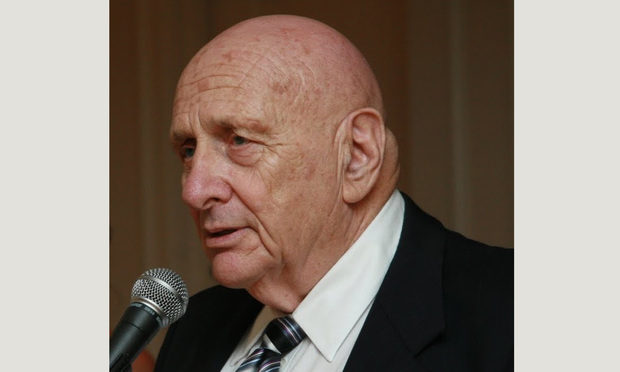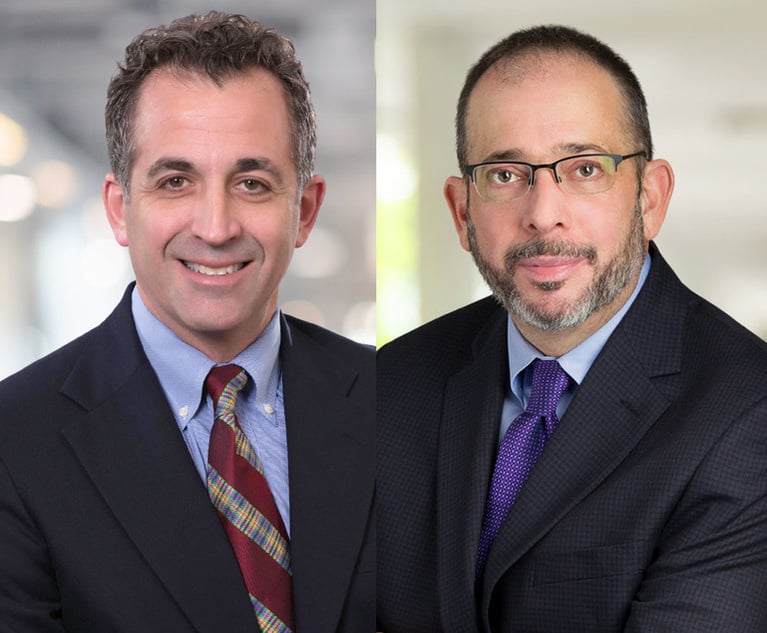John Gotti's Lawyer, Miami Criminal Defense Legend Albert Krieger, Has Died
"Liberty is less well defended with Albert's passing," said fellow criminal defense attorney and friend Martin G. Weinberg.
May 18, 2020 at 02:58 PM
7 minute read
 Miami criminal defense attorney Albert Krieger. Courtesy photo.
Miami criminal defense attorney Albert Krieger. Courtesy photo.
Criminal defense attorney Albert J. Krieger died in Miami on Thursday, with his wife Irene Stoller Krieger at his side. He was 96.
Krieger's cases were the stuff of legend, inspiring movies like "The Godfather" and "The French Connection." Among his most notorious clients: New York crime family bosses "The Teflon Don" John Gotti and Joseph "Joe Bananas" Bonanno, and Miami "cocaine cowboys" Sal Magluta and Willie Falcon.
People often ask Krieger's daughter, Miami-Dade County Court Judge Luise Krieger-Martin, what it was like growing up with him, remarking that, "Oh my goodness, he's so intimidating." But she describes a compassionate man who filled the house with laughter — and always carried a copy of the U.S. Constitution in his pocket.
"He was like everybody's teddy bear," Krieger-Martin said. "He was larger than life in every way."
Krieger's surname means "warrior." And it's an apt description, the way his daughter sees it, as his work was not just a job but a noble cause. More important than the verdict, for Krieger, was standing up for the fundamental principles of democracy, by ensuring a defendant's procedural protections were fulfilled, and that everyone understood why they had to be.
Krieger also represented dozens of lawyers and businessmen during his more than 60-year career, but closest to his heart was his pro bono defense of members of the Lakota Sioux tribe and the American Indian Movement, charged over a standoff at Wounded Knee in 1973. After commuting back and forth to South Dakota for almost a year, Krieger secured acquittals, or got charges dismissed, for all but two of 150 defendants.
Krieger's cross-examinations were expert, and it wasn't unusual for his speeches to give people chills or move them to tears, his daughter says, thanks to his intellect, charisma and deep, powerful voice. His freakish ability to recite evidence, testimony and case law without any notes also didn't hurt.
Krieger-Martin often followed her father across the country to conferences and seminars with her four siblings and joined his practice as a young graduate. There, Krieger's pro bono work inspired her to become a public defender.
"We talked about big things at the dinner table," Krieger-Martin said.
'A lion'
Born Nov. 4, 1923, Krieger grew up in New York and attended New York University with a football scholarship. He obtained his law degree after serving in the U.S. Army during World War II, helped found the National Criminal Defense College and was an original member of the National Association of Criminal Defense Lawyers.
Krieger's effect on the criminal defense profession was unmatched, according to NACDL executive director Norman Reimer.
"It's one of the few occupations that is identified in the Constitution as required. Everyone is entitled to a lawyer when they're accused of a crime. But it did not enjoy high stature in the profession until Albert came along and elevated it," Reimer said. "In an era when we really need heroes, he was one of them. He stood for principles that are vital to our democracy and he did it in a way that lent dignity and honor to the profession."
Krieger served as NACDL president from 1979 to 1980 and received its Lifetime Achievement Award in 1987. His mantra, according to Reimer, was that a lawyer's credibility will determine the outcome of their client's case.
"You have to always maintain your credibility with the court, with the jury, with your adversaries," Reimer recalls Krieger saying. "If you do that, then you're on a pathway to persuading them to find the way you want them to."
Roy Black of Black, Srebnick, Kornspan & Stumpf in Miami said Krieger was one of the greats, describing him as "a lion roaming the courtroom eyeing the witness as prey."
"It is hard to imagine that his deep resonate lion's voice will be forever stilled. He played it like a Stradivarius with perfect diction while raising and lowering the decibels for emphasis," Black said. "His true forte was cross-examination. He could intimidate anyone from the hedging federal agent to his co-counsel while making the jury his partner in the quest for answers."
Having tried two "long and challenging" cases with Krieger, Boston attorney Martin G. Weinberg witnessed "an indomitable voice for the defense, a linchpin of the defense bar during trying times, a fearless and eloquent and masterful defender of liberty."
"I learned and internalized much from him and am forever grateful for these lessons," Weinberg said. "Liberty is less well defended with Albert's passing. Those he taught have an added obligation to make sure his principles and teaching do not fade with time."
Because he said so
Krieger was an unflappable and fearless man with an extraordinary vocabulary, according to Miami criminal defense attorney Scott Srebnick, who spent seven years working from his home office.
"I can't recall a single time he chose the wrong word in a sentence or used a word out of context," Srebnick said.
Srebnick also witnessed the powers of Krieger's credibility — most notably in the 1990s, during a trial that resulted in a hung jury. With Weinberg, Krieger represented attorney William Moran, accused of helping Colombia's Cali cartel, while Srebnick and his brother Howard represented fellow attorney and co-defendant Michael Abbell.
Srebnick still marvels when he recalls how one juror reached out afterward and remarked, "I knew that Mr. Moran was not guilty because Mr Krieger said he was not guilty."
And it wasn't just a courtroom thing, according to Krieger-Martin and her siblings.
"The thing that we're probably going to miss most is Daddy being able to be there to tell us, when things are bad, that everything's going to be OK," Krieger-Martin said. "Because when he told you it was going to be OK, you believed it."
Despite his busy litigation practice, Krieger never turned down any request for help or advice, according to Miami-Dade Circuit Judge Milton Hirsch, who said he was one of many lawyers who'd call and say, "I'm sorry to bother you, but here's the situation. I'm thinking about doing this. What do you think?"
"Why should a man take time out from his very demanding schedule to help every lawyer, near and far, with those kinds of questions?" Hirsch said. "But it was so important to him that every criminal defense lawyer give their client the very best possible defense."
In 26 years, Miami attorney Brian Tannebaum said Kreiger went from idol, to mentor, to friend, to co-counsel.
"There will never be another Albert J. Krieger," Tannebaum said. "When I met him he was 'the guy who represented John Gotti.' When he died, he was one of the pillars of my career."
The NACDL remembered Krieger through an interview he gave for its 50th anniversary gala, when he described the importance of his profession:
"The criminal defense lawyer marches into the pit, often unloved by everyone in the courtroom, but with the courage, strength and mind to make our Constitution live as a vibrant being in that courtroom on behalf of someone who at that moment stands for all the principles of freedom and dignity that have been preserved in our Constitution," Krieger said. "It is a chore in many respects. It is difficult in all respects. It is tiring. It is demanding. But it is what we signed up for."
Krieger taught at Harvard Law School's Trial Advocacy Workshop for more than 30 years, loved to go out fishing and sailing, and did plenty of traveling with his wife of 74 years. He has five children, nine grandchildren and five great-grandchildren.
Krieger's burial will be held at Beth David Mount Nebo Cemetery in Miami, and his family plans to hold a memorial service when the COVID-19 pandemic allows. Donations in his memory can be made to the NACDL Foundation for Criminal Justice.
This content has been archived. It is available through our partners, LexisNexis® and Bloomberg Law.
To view this content, please continue to their sites.
Not a Lexis Subscriber?
Subscribe Now
Not a Bloomberg Law Subscriber?
Subscribe Now
NOT FOR REPRINT
© 2025 ALM Global, LLC, All Rights Reserved. Request academic re-use from www.copyright.com. All other uses, submit a request to [email protected]. For more information visit Asset & Logo Licensing.
You Might Like
View All
Facing a Shrinking Talent Pool, Insurance Defense Firms Are Fighting to Add Attorneys
6 minute read
Blank Rome Adds 4 From Akerman in Second 2024 White Collar Group Hire
4 minute read
Phila.-Based Weber Gallagher Opens Florida Outpost With Fowler White Partner
4 minute read
As Donald Trump's Legal Troubles Mount, Here's Who is Representing Him in His Classified Documents Case Out of Florida
4 minute readTrending Stories
Who Got The Work
J. Brugh Lower of Gibbons has entered an appearance for industrial equipment supplier Devco Corporation in a pending trademark infringement lawsuit. The suit, accusing the defendant of selling knock-off Graco products, was filed Dec. 18 in New Jersey District Court by Rivkin Radler on behalf of Graco Inc. and Graco Minnesota. The case, assigned to U.S. District Judge Zahid N. Quraishi, is 3:24-cv-11294, Graco Inc. et al v. Devco Corporation.
Who Got The Work
Rebecca Maller-Stein and Kent A. Yalowitz of Arnold & Porter Kaye Scholer have entered their appearances for Hanaco Venture Capital and its executives, Lior Prosor and David Frankel, in a pending securities lawsuit. The action, filed on Dec. 24 in New York Southern District Court by Zell, Aron & Co. on behalf of Goldeneye Advisors, accuses the defendants of negligently and fraudulently managing the plaintiff's $1 million investment. The case, assigned to U.S. District Judge Vernon S. Broderick, is 1:24-cv-09918, Goldeneye Advisors, LLC v. Hanaco Venture Capital, Ltd. et al.
Who Got The Work
Attorneys from A&O Shearman has stepped in as defense counsel for Toronto-Dominion Bank and other defendants in a pending securities class action. The suit, filed Dec. 11 in New York Southern District Court by Bleichmar Fonti & Auld, accuses the defendants of concealing the bank's 'pervasive' deficiencies in regards to its compliance with the Bank Secrecy Act and the quality of its anti-money laundering controls. The case, assigned to U.S. District Judge Arun Subramanian, is 1:24-cv-09445, Gonzalez v. The Toronto-Dominion Bank et al.
Who Got The Work
Crown Castle International, a Pennsylvania company providing shared communications infrastructure, has turned to Luke D. Wolf of Gordon Rees Scully Mansukhani to fend off a pending breach-of-contract lawsuit. The court action, filed Nov. 25 in Michigan Eastern District Court by Hooper Hathaway PC on behalf of The Town Residences LLC, accuses Crown Castle of failing to transfer approximately $30,000 in utility payments from T-Mobile in breach of a roof-top lease and assignment agreement. The case, assigned to U.S. District Judge Susan K. Declercq, is 2:24-cv-13131, The Town Residences LLC v. T-Mobile US, Inc. et al.
Who Got The Work
Wilfred P. Coronato and Daniel M. Schwartz of McCarter & English have stepped in as defense counsel to Electrolux Home Products Inc. in a pending product liability lawsuit. The court action, filed Nov. 26 in New York Eastern District Court by Poulos Lopiccolo PC and Nagel Rice LLP on behalf of David Stern, alleges that the defendant's refrigerators’ drawers and shelving repeatedly break and fall apart within months after purchase. The case, assigned to U.S. District Judge Joan M. Azrack, is 2:24-cv-08204, Stern v. Electrolux Home Products, Inc.
Featured Firms
Law Offices of Gary Martin Hays & Associates, P.C.
(470) 294-1674
Law Offices of Mark E. Salomone
(857) 444-6468
Smith & Hassler
(713) 739-1250






